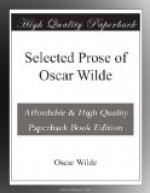My dear Robbie,—I simply cannot write. It is too horrid, not of me, but to me. It is a mode of paralysis—a cacoethes tacendi—the one form that malady takes in me.
Well, all passed over very successfully. Palermo, where we stayed eight days, was lovely. The most beautifully situated town in the world—it dreams away its life in the concha d’oro, the exquisite valley that lies between two seas. The lemon groves and the orange gardens were so entirely perfect that I became quite a Pre-Raphaelite, and loathed the ordinary impressionists whose muddly souls and blurred intelligences would have rendered, but by mud and blur, those “golden lamps hung in a green night” that filled me with such joy. The elaborate and exquisite detail of the true Pre-Raphaelite is the compensation they offer us for the absence of motion; literature and motion being the only arts that are not immobile.
Then nowhere, not even at Ravenna, have I seen such mosaics as in the Capella Palatine, which from pavement to domed ceiling is all gold: one really feels as if one was sitting in the heart of a great honey-comb looking at angels singing: and looking at angels, or indeed at people, singing, is much nicer than listening to them, for this reason: the great artists always give to their angels lutes without strings, pipes without vent-holes, and reeds through which no wind can wander or make whistlings.
Monreale you have heard of—with its cloisters and cathedral: we often drove there.
I also made great friends with a young seminarist, who lived in the cathedral of Palermo—he and eleven others, in little rooms beneath the roof, like birds.
Every day he showed me all over the cathedral, I knelt before the huge porphyry sarcophagus in which Frederick the Second lies: it is a sublime bare monstrous thing—blood-coloured, and held up by lions who have caught some of the rage of the great Emperor’s restless soul. At first my young friend, Giuseppe Loverdi, gave me information; but on the third day I gave information to him, and re-wrote history as usual, and told him all about the supreme King and his Court of Poets, and the terrible book that he never wrote. His reason for entering the church was singularly mediaeval. I asked him why he thought of becoming a clerico, and how. He answered: “My father is a cook and most poor; and we are many at home, so it seemed to me a good thing that there should be in so small a house as ours, one mouth less to feed; for though I am slim, I eat much, too much, alas! I fear.”
I told him to be comforted, because God used poverty often as a means of bringing people to Him, and used riches never, or rarely; so Giuseppe was comforted, and I gave him a little book of devotion, very pretty, and with far more pictures than prayers in it—so of great service to Giuseppe whose eyes are beautiful. I also gave him many lire, and prophesied for him a Cardinal’s hat, if he remained very good and never forgot me.




